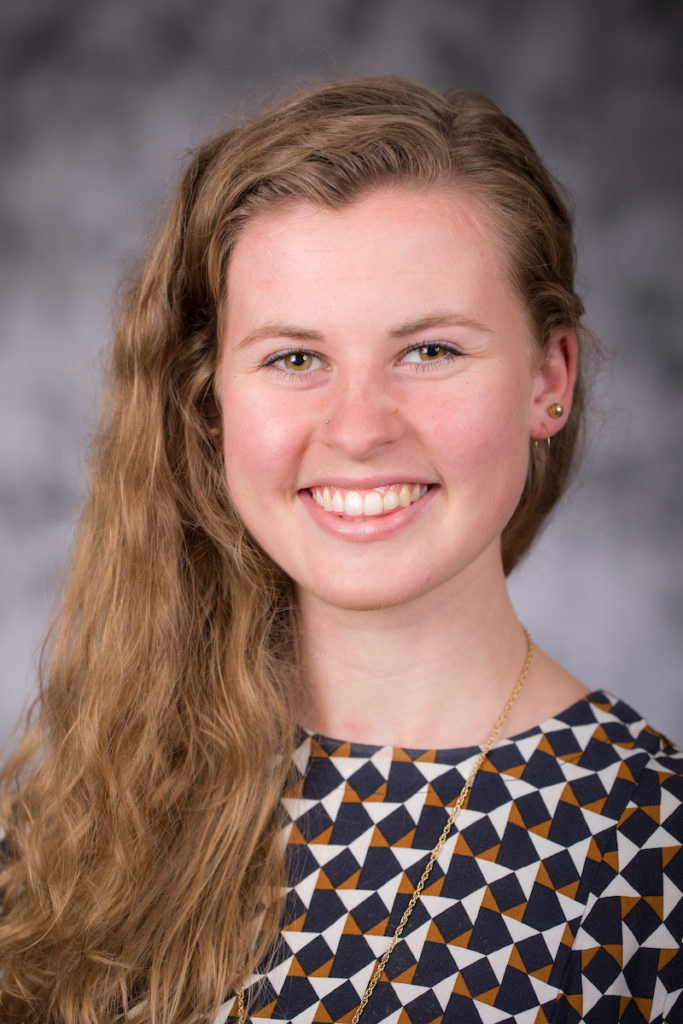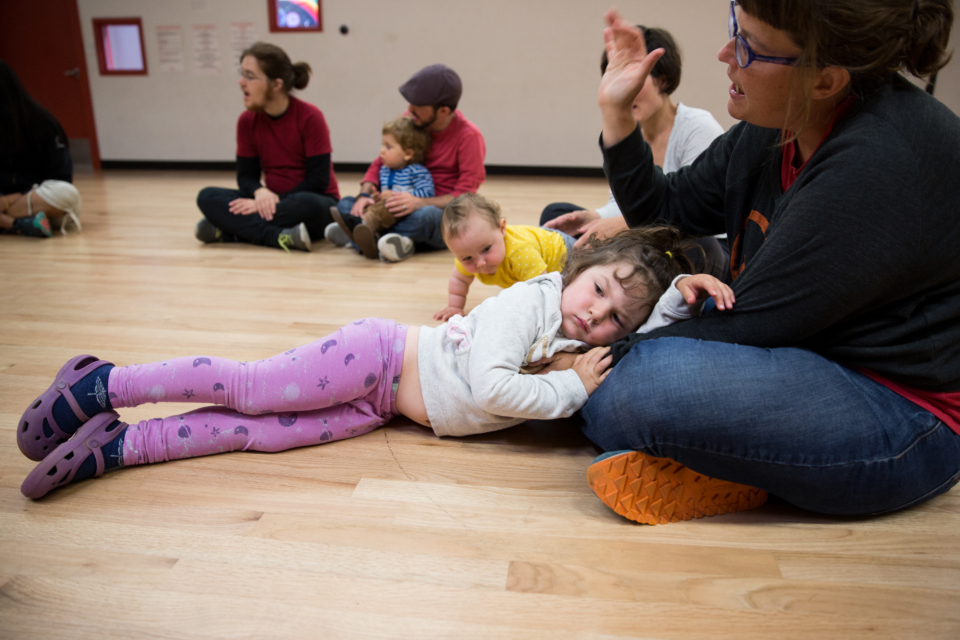Alex Driehaus
Finalist
Ohio University
$1,500 Scholarship and Hearst Medallion

 (A) Lola Dvorak moved to San Francisco 13 years ago from a rural town in Wisconsin. She didn't intend to stay in the area, but fell in love with it and with her now-wife, Dina. The couple has been together for 10 years, and in 2013 they welcomed their first child, Etta.
(A) Lola Dvorak moved to San Francisco 13 years ago from a rural town in Wisconsin. She didn't intend to stay in the area, but fell in love with it and with her now-wife, Dina. The couple has been together for 10 years, and in 2013 they welcomed their first child, Etta.
Lola and Dina now live in a small house in Oakland. During the days Lola balances caring for Etta and working from home while Dina works downtown in the banking industry.
For Lola, the Bay Area is an ideal place to raise her daughter, because here "nobody cares if you're a gay family... it's almost an asset."
--------
Etta lays in Lola's lap during a playgroup for LGBTQ parents and their children, which is held every Tuesday. Though Etta has been attending the group regularly since she was a baby, she still sometimes gets bouts of shyness and refuses to leave her mother's side. (A) Lola and Etta look both ways before crossing the street as they walk around the neighborhood with another family from playgroup. It is important to Lola that Etta spends time with other LGBTQ families, and that she is exposed to more cultures than Lola was growing up.
(A) Lola and Etta look both ways before crossing the street as they walk around the neighborhood with another family from playgroup. It is important to Lola that Etta spends time with other LGBTQ families, and that she is exposed to more cultures than Lola was growing up. (A) Lola and Etta cuddle on a swing at the park. Lola says that legally, living in California has made it much easier to have a child as a gay couple. Though she didn't give birth to Etta, her name is on the birth certificate, and the state helped to streamline her adoption of Etta.
(A) Lola and Etta cuddle on a swing at the park. Lola says that legally, living in California has made it much easier to have a child as a gay couple. Though she didn't give birth to Etta, her name is on the birth certificate, and the state helped to streamline her adoption of Etta. (A) Lola kisses Etta on the cheek before she runs off to play with her friends. Lola is often far more comfortable in small groups, and is happy to run around with one or two other kids.
(A) Lola kisses Etta on the cheek before she runs off to play with her friends. Lola is often far more comfortable in small groups, and is happy to run around with one or two other kids. (A) Lola and Etta look down at Temescal Creek, which runs underground, with their family friend Suzanna Pena and her son Benat. Most of the creeks in the area now run underground because they have been built over in order to make room for housing and other developments.
(A) Lola and Etta look down at Temescal Creek, which runs underground, with their family friend Suzanna Pena and her son Benat. Most of the creeks in the area now run underground because they have been built over in order to make room for housing and other developments. (A) Lola carries Etta to the car after a long day at the park. Etta has recently stopped taking naps, which means Lola no longer gets an hour to herself in the afternoons.
(A) Lola carries Etta to the car after a long day at the park. Etta has recently stopped taking naps, which means Lola no longer gets an hour to herself in the afternoons. (A) Lola tries to convince Etta to put her shoe back on before strapping her into her car seat. Etta loves purple and pink and frills of all kinds, which Lola finds surprising since she isn't surrounded by that at home. "Having kids is really heteronormative and gendered," Lola said, even in the very liberal Bay Area.
(A) Lola tries to convince Etta to put her shoe back on before strapping her into her car seat. Etta loves purple and pink and frills of all kinds, which Lola finds surprising since she isn't surrounded by that at home. "Having kids is really heteronormative and gendered," Lola said, even in the very liberal Bay Area. (A) Lola makes lunch for herself and Etta. Most of Lola's day-to-day activities are just like every other family's. "A lot of stuff is pretty mundane, but maybe it's weird because it's queer," Lola said.
(A) Lola makes lunch for herself and Etta. Most of Lola's day-to-day activities are just like every other family's. "A lot of stuff is pretty mundane, but maybe it's weird because it's queer," Lola said. (A) Lola watches Etta with amusement as she talks about whatever comes to mind.
(A) Lola watches Etta with amusement as she talks about whatever comes to mind. (A) Lola says that she often forgets to "out" herself now, since being gay has become an everyday part of her life. She once forgot to tell a conservative Christian babysitter that Etta has two moms and worried about it until she came home to find a family portrait that Etta had asked the babysitter to draw for her.
(A) Lola says that she often forgets to "out" herself now, since being gay has become an everyday part of her life. She once forgot to tell a conservative Christian babysitter that Etta has two moms and worried about it until she came home to find a family portrait that Etta had asked the babysitter to draw for her. (A) Lola tickles Etta as they sit on the floor of her bedroom before her afternoon quiet time. Lola feels relatively sheltered from the discrimination that some LGBTQ families face around the country. "I like to think that the world is changing," Lola said, "but after the election I was like eff no... I was surprised that mindset still exists."
(A) Lola tickles Etta as they sit on the floor of her bedroom before her afternoon quiet time. Lola feels relatively sheltered from the discrimination that some LGBTQ families face around the country. "I like to think that the world is changing," Lola said, "but after the election I was like eff no... I was surprised that mindset still exists." (A) Etta pets the family cat, Kitty Hufflepuff, who like the rest of the household is female. Lola and her family took a trip to D.C. during the Inauguration and the Women's March. She worried that her and Dina's stress was rubbing off on Etta when she asked "why doesn't Donald Trump like me?" However, they quickly found out that Etta wasn't picking up on her parents' feelings, she just thought the president looked mean in photos.
(A) Etta pets the family cat, Kitty Hufflepuff, who like the rest of the household is female. Lola and her family took a trip to D.C. during the Inauguration and the Women's March. She worried that her and Dina's stress was rubbing off on Etta when she asked "why doesn't Donald Trump like me?" However, they quickly found out that Etta wasn't picking up on her parents' feelings, she just thought the president looked mean in photos. (A) Single - From left to right, Lucy Tofler, Leslie Mueller and Gabriel Gold joke around as they fill their plates before a communal meal. All three live at The Convent Arts Collective, a living-working space housed in a former nunnery in the Lower Haight area. The Convent not only offers its 25 residents relatively low rent prices at a time when the cost of living in San Francisco is incredibly high, but more importantly the space fosters a sense of community for the artists who live there.
(A) Single - From left to right, Lucy Tofler, Leslie Mueller and Gabriel Gold joke around as they fill their plates before a communal meal. All three live at The Convent Arts Collective, a living-working space housed in a former nunnery in the Lower Haight area. The Convent not only offers its 25 residents relatively low rent prices at a time when the cost of living in San Francisco is incredibly high, but more importantly the space fosters a sense of community for the artists who live there.

